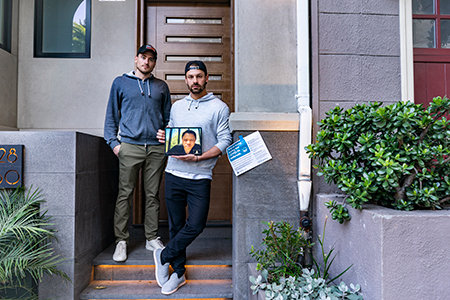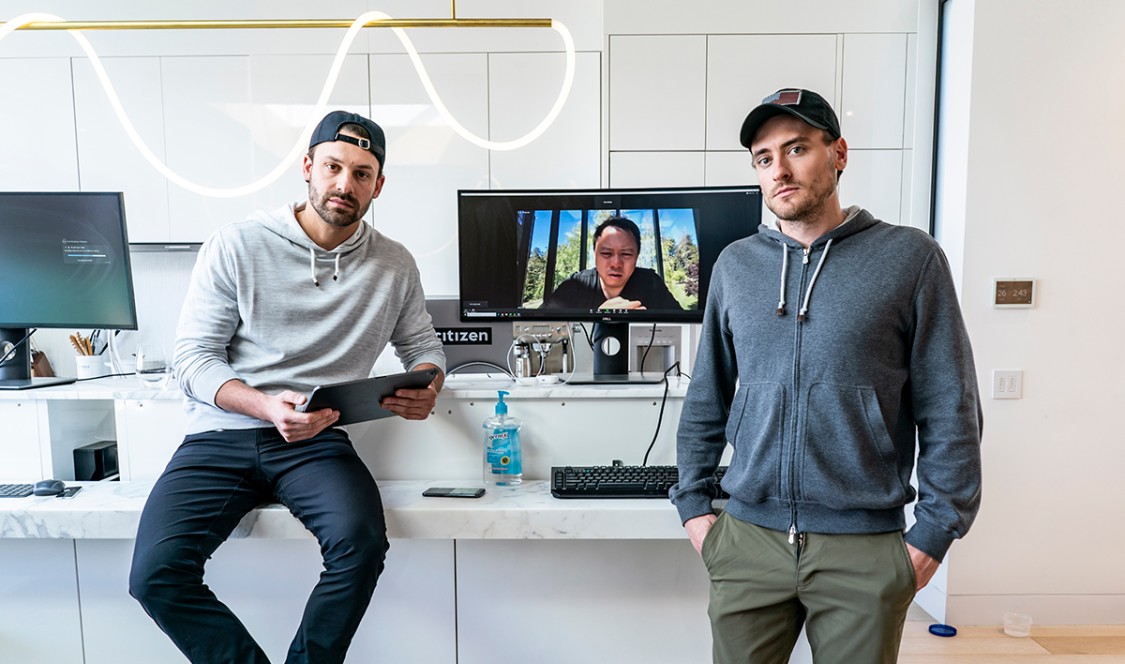Pandemic heroes typically wear masks and latex gloves.
Tech venture capitalist Drew Oetting ’12 doesn’t need to wear protective gear for work. But he’s a pandemic hero all the same—procuring masks, by the millions, for others, and charging nothing for his services.
As the scramble for hospital-grade face masks unleashed what the Wall Street Journal calls “global supply-chain bedlam,” this 29-year-old CMC alumnus has improvised new ways to get personal protective equipment (PPE) to those in dire need.
Operation Masks started in mid-March as a horrified nation watched front-line hospital workers, faced with a critical shortage of masks, risking their own lives to care for infected patients.
“The problem,” said Oetting, who graduated from CMC with honors in math and economics in 2012, “is that we have a massively decentralized procurement process in the United States. Every hospital, every state, and every city is on the market trying to procure. You have states bidding against each other, hospitals bidding against other hospitals, and all of them bidding against FEMA. What we’re trying to do is open up new supplies that we can have confidence in. But that takes time. So, in the interim, we’re trying to help individual hospitals, cities, and state governments that lack sophisticated supply procurement processes.”
In the March 28 article headlined “Two Best Friends and the Treasure Hung for Coronavirus Supplies,” Wall Street Journal business reporter Rob Copeland described Oetting’s epiphany. The week before, he’d heard from a contact at a small logistics company specializing in luxury items. The source told Oetting he had access to a huge stockpile of masks and ventilators. Did Oetting know anyone in need?
Oetting blasted out an email to his wider network of warehouse owners and manufacturers in Brazil, Vietnam, and Saudi Arabia. Almost immediately he was inundated with calls and text messages.
“Hundreds of millions—if not billions—of PPE right now are not being used by hospitals. That’s because they’re either being stockpiled by governments or by profit-seeking entrepreneurs hoping they can sell at a higher price in the future.”
Normally this is a pretty boring business, but “now wholesalers have the keys to the kingdom,” Oetting said. “They and their distribution partners are taking that product and selling it in a very different way than they traditionally do.”
Oetting sprang into action. He pulled together a team, including roommate and business partner Jake Medwell, along with two other partners from 8VC, the San Francisco venture capital firm he co-founded in 2016. Together with investor Robin Chan and a handful of others with deep contacts in the Chinese manufacturing sector, they cobbled together “an improbable gateway to hundreds of millions of protective supplies stored away in warehouses, factories and garages across four continents,” according to the Wall Street Journal.
In its first two weeks, Operation Masks brokered deals for one million N95 masks for the state of New York and 200,000 masks for Hawaii. When the team hits its stride, Oetting anticipates they’ll move up to 2 million masks a week.
The New York Times and the Financial Times also recently spotlighted Operation Masks in major articles.
Matchmaker
Medical-supply arbitrage isn’t so different from Oetting’s day job as a partner in 8VC. “When I’m working on connecting one of our portfolio companies to a customer or an investor, it’s kind of the same thing as connecting a potential supplier to a hospital,” he said. “It’s a lot of calls and emails, making quick decisions on what is and isn’t worth investing your time in, and then moving on to the next thing. It’s deal-making.”
With the virus-related slowdown in the investing world, Oetting said he now devotes half his time to Operation Masks.
The demand for PPEs is two-pronged: there’s the spot market, for buyers and sellers looking for inventory that exists today; and there’s the futures market, which identifies manufacturers building or retooling their factories to increase the global supply of masks. American buyers need both, Oetting said.
Operation Masks basically functions as a matchmaker. Through its website, the group sets up relationships to bring masks, gloves, and other PPE to the United States, helping out with logistics around payment, factory procurement, shipping and ground delivery.
While the team has neither the capacity nor expertise to screen for counterfeit products or fraud, Oetting and his partners are getting good at weeding out shady operators. “Once you’ve seen a hundred of these suppliers,” he said, “you can tell. There’s a relatively detailed logic to how PPEs are documented.”
To help reduce risks for hospitals new to wholesale procurement, Operation Masks coaches buyers in how to manage cash transactions, how to correctly set up escrow, how to evaluate past customer experiences, and how to identify sellers with “skin in the game.”
If the team locates a big PPE stash, Operation Masks directs the source to federal government, which has its own people on the ground in China and elsewhere to vet manufacturing methods and supply quality.
“It’s a Very Claremont-McKenna-style Problem”
Oetting, who hails from Iowa City, Iowa, and now lives in San Francisco, believes his CMC education prepared him well for his new role setting up Operation Masks.
“The general culture and ethos of Claremont McKenna,” he said, “is very good for a project like this—where you have to spin stuff up quickly, get it moving, work with other people, and rapidly learn about something you didn’t know much about.”
“Claremont is a pragmatic place, and what we’re trying to do with Operation Masks is pretty pragmatic. It does feel like a very Claremont McKenna-style problem to solve. Obviously, there’s a fair amount of economics and business logic involved. You also have to build a lot of relationships, rely on others, and deal with ambiguity. I think Claremont really teaches that very well. There may not be a perfect solution. It’s something we can chip away at, and maybe with a bunch of other people also chipping away at it, we will make a difference,” Oetting said.

Drew Oetting '12, left, and Jake Medwell
In His Own Words
On counterfeits and risk management:
In a really competitive market like this, there needs to be some way to enable people to take risk. The Italian and Japanese governments are buying PPE cash up-front and taking the risk. If 20 percent of what’s delivered is counterfeit, the way they deal with it is to say: ‘Well, we just paid 20 percent more. Throw the bad stuff away.’
A hospital doesn't have that level of tolerance. They only have so much capital. A procurement person might get fired for a bad order.
Hospitals getting counterfeit products, impromptu products or stuff just not showing up—it’s really unfortunate. I’m hopeful FEMA will eventually figure out a mechanism for backstop, be able to lend vetting capability and also lend risk-tolerant capital to offset losses to these local hospitals and communities.
On Long-Term Operation Masks Goals:
We hope to build a flywheel where we can meet demand in real-time, where we know that it’s real product with people that we have relationships with, where hospitals can come to the website and actually order.
In the long run, we want to make ourselves irrelevant. Hopefully over time there’ll be no need for Operation Masks.
On the Environmental Impact of Ramping Up Mask Production:
These masks are made with a byproduct of the oil refining process. That’s what gives them their clinical value in terms of preventing infection. So there’s a question of whether this is actually repurposing of fossil fuels.
But there are going to be tons and tons of mask thrown out—no question about that. It doesn’t make sense for us just to wear masks once. Re-use will alleviate overall demand.
There are three interesting technologies being explored now. One is a heat-based purification process. A Stanford study shows you can safely bake masks at 160 degrees for 30 minutes. A second technology uses an ultra-violet-based irradiation process. The last is a vapor-phase hydrogen peroxide decontamination system, pioneered by defense contractor Battelle. They have been working on a decontamination product for viruses for a while, for which they got fast-track FDA approval a few days ago. It looks like a pod container you’d get from U-Haul. Each can process 80,000 masks a day, killing any viruses without degrade the filtering materials. The FDA approved up to 20 reuses per mask, which is pretty great.
On Drew Oetting’s Stake in the Game:
My biggest concern was that people are not able to work. I don’t know if, as a society, we’ve ever had such a freeze of productivity: maybe during the Oil Embargo or the Great Depression. The idea that there are going to be tens of millions of people just in the U.S. who are structurally unemployed is scary to me.
We need to get young people back to work. Right now we can’t even get enough PPE for clinical workers and front-line workers. Now imagine everyone working in a restaurant, hotel or airplane needing masks of the same quality. You’re talking about billions, probably tens of billions of masks.
If we don’t solve the way to get PPE into the United States, then we will not be able to effectively get our economy jumpstarted.
Mask Emergency
In February, the U.S. Department of Health and Human Services estimated that America will need 300 million N95 masks to combat the coronavirus.
N95 is the gold standard for protection against COVID-19. It uses a special fabric that blocks 95 percent of small particles, unlike much-easier-to-produce surgical masks. It’s in high demand the world over, which has led to critical shortages. A single hospital can burn through tens of thousands of masks a day.
Before the pandemic, China produced half of the world’s face masks—nearly 20 million a day. As the virus spread domestically, China stopped exporting masks and imported most of the world’s supply. When the disease spread beyond China’s borders, there weren't enough N95 masks to go around. China has since ramped up total mask production to 116 million a day, but it still only makes 1.6 million N95 masks a day: the special fabric it requires is also in short supply.
About Drew Oetting
Drew Oetting graduated with degrees in mathematics and economics from Claremont McKenna College. He was a Robert Day Scholar, a two-time Bill Gates Investment Asset Management Fellow and CEO of the Student Investment Fund. In college he played varsity golf and sang in a professional a cappella group. Originally from Iowa City, Iowa, he enjoys tennis, golf, snowboarding and philosophy
—Diane Krieger

